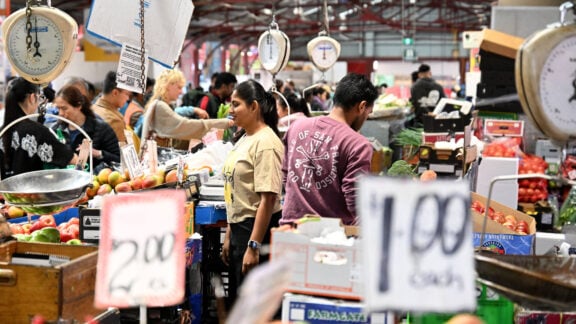Julia Gillard’s ascendancy to the Labor party leadership and, as a consequence, the prime ministership of Australia was expedited by factional convenors at the behest of a panicky back-bench with the aim of achieving two immediate outcomes: first, solve the policy problems that crippled Kevin Rudd’s prime ministership; and, second, get ready for a general election that seems likely to be held some time in August.
<p>Labor has two core constituencies: a blue-collar vote that agrees with the conservative argument that borders should be sealed, and a white collar constituency that argues for an open border on grounds of compassion.</p>
Of the policy debates that led to Kevin Rudd’s demise, two have been particularly prominent.
One was the Resources Super Profits Tax – a proposal handled so badly by Rudd that not even the name of the tax has survived the Gillard revision. Now called the Mining Resources Rent Tax, the new prime minister has succeeded in getting this matter off the agenda.
National border security, on the other hand, has been the other policy headache for Labor which has been less easy to resolve.
Under this heading comes consideration of the matter of what to do with ‘asylum seekers’ or ‘boat people’ who try to come to Australia via unauthorised means (usually on a leaky Indonesian fishing boat).
Before you know it, debates about the appropriate response to the human tragedy of people seeking to flee war zones can become rather ugly discourses about national interest and national identity, immigration and population even though asylum seekers make up less than 2 percent of arrivals.
The intensity of this debate increased in Australia around September 2001 in the aftermath of the World Trade Centre terrorism attack in New York.
This happened to coincide with an increase in the number of people desperately seeking ways to escape to Australia via unauthorised means especially from hot spots such as Iraq, Afghanistan and Sri Lanka.
With his government facing annihilation at the next poll thanks to his GST, then prime minister John Howard needed a new narrative with which to contest the 2001 election.
The coincidence of the shocking events in New York with another round of ‘boat people’ testing the ability of the Australian navy to maintain Australia’s maritime border gave Howard the opportunity to recast the national political debate amidst a growing sense of insecurity in the Australian community.
The Howard narrative conflated sealing the border with standing side by side with the Americans in the ‘war on terror’.
The voters loved it, and the Howard government was re-elected.
The Liberals were thus alerted to how effective it was in taking a hard line on border security could appeal to voters in marginal seats, and this has been an article of faith for conservative politics ever since.
Labor was also alerted to the politics of border security, but for different reasons.
While most conservatives appeared to be comfortable with rallying around policies geared to sealing Australia’s borders, the question of how ‘asylum seekers’ should be treated has the potential to fundamentally divide the Labor party not only within its own ranks but also out in the electorate.
Labor has two core constituencies: a blue-collar vote that agrees with the conservative argument that borders should be sealed, and a white collar constituency that argues for an open border on grounds of compassion. Labor’s parliamentary leaders thus face a dilemma: take a hard line on border security and risk alienating its white collar vote, or accommodate asylum seekers and risk alienating ‘the battlers’.
This is precisely the conundrum that Julia Gillard faced when dealing with her government’s new border security policy, and the decision she has taken has been one designed to ingratiate her government with blue collar voters.
The reason for this can be found in some simple electoral mathematics. Labor currently has a majority of 27 seats.
Of these, eight seats in NSW and 10 seats in Queensland alone could be lost with swings to the Coalition of up to four percent. Most of Labor’s ultra-marginal seats are of a similar type: seats covering the outer suburbs of Sydney and Brisbane and seats covering regional areas in nearly every state.
These are, of course, the very sort of seats in which there is little voting sympathy for the plight of boat-people. These are also the seats that decide which party will govern Australia.
By way of contrast, Labor’s white-collar, social progressive constituency is clustered in a handful of inner city seats, of which only one – the federal seat of Melbourne – is under any real threat of being lost to the Greens.
The maths are simple: Ms Gillard has no choice other than to try to outflank the Liberal and National parties by incorporating the main themes in their approach as part of Labor policy and that is precisely the direction she has taken.
Julia Gillard is a political realist, and her asylum seeker policy is realistic in the sense that it is designed to maximises Labor’s chances at the next election. Whether it is practical, let alone humane, is another matter.
Dr Nick Economou is a senior lecturer at Monash University Politics Department and a regular media comentator.








